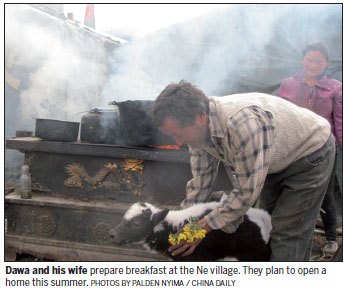Tourism gets quake-struck village back on track
By Palden Nyima in Gyirong, Tibet (China Daily USA) Updated: 2017-06-23 12:30
For many people in the Tibet autonomous region, their daily lives have slowly been returning to normal, following the magnitude 8.1 earthquake that struck Nepal on April 25, 2015.
Bordering Nepal, Tibet's 18 counties were badly affected by the quake, with reconstruction work that has been in process for two years still not complete.
Known as the Back Garden of Qomolangma - which is known as Mount Everest in the West - Tibet's Gyirong county was one of the worst hit in the region.
At Ne, more than 80 percent of the village's 68 houses collapsed or were damaged, while roads to the village were destroyed.
With four of the reported 27 deaths caused by the quake in the region from the village, Ne was the county's most severely affected village.
Construction of housing and a new village road is ongoing with the support of the local government.
Surrounded by snow-capped mountains overlooking forests and grassland, Ne has become a tourism spot in recent years.
But after the earthquake, the village only received about 20,000 tourists in 2015, according to the county's tourism bureau.
"Thanks to reconstruction efforts, the village received about 100,000 tourists in 2016, with tourism revenue exceeding 50 million yuan ($7.3 million)," said Tsesang, director of the county's tourism bureau.
A quake-relief house construction project will ensure that every household has a room to use as a family inn, decorated by a local tourism company.
"Villagers have been selling local specialties such as Tibetan chicken eggs, fungus and mushrooms to tourists, with average revenue from tourism reaching about 30,000 yuan a year per household," Tsesang said.
"The tourism company has promised to bring tourists to the village. A tourism service center will be built here, with the company and villagers sharing the tourism profits."
According to Tsesang, villagers will receive 70 percent of the profits, and they can also make money by selling local specialties.
Penpa, deputy director of the county's development and reform commission, said Gyirong has combined tourism and quake reconstruction efforts to benefit the village.
"In addition to the family inn program, we would like to introduce services such as bus tours and rental of eco-friendly cars to the village. Tourists can also watch the sunrise and sunset from the village," Penpa said.
Penpa said construction is expected to be completed by the end of the year.
In addition, a concrete road is being built to connect the village to the nearest town center, giving tourists easy access to the village to watch azalea flowers, purchase wooden handicrafts and enjoy local delicacies, such as cheese and yogurt.
Nyima Wangdu, former village leader of Ne, was the first person in the village to operate an inn service and benefit from tourism.
Before the earthquake, the county tourism bureau provided him with 40,000 yuan in funding for his business. He also invested 120,000 yuan of his own savings, developing a homestay offering nine rooms with 23 beds.
"In the past, there were very few families operating inns, but since this year, all families in the village whose houses are complete have started to do so," Nyima Wangdu said. "Tourists come in the summer. I have been making a living from tourism for more than 10 years. I receive an annual income of 50,000 to 60,000 yuan."
However, due to a local sand factory being closed, construction of more than 50 percent of houses in the village is still not completed, and it is inconvenient for villagers to live in tents.
"Our village sits at an altitude of about 3,000 meters, so it is hot in summer, and when it snows in winter, it is not safe to live in tents," Nyima Wangdu said.
"The reconstruction has taken a long time as it was difficult to transport the materials needed to the village, and the planning of the project was a lengthy process."
Another villager, Dawa, said there are 13 people in his family. His house collapsed in the quake, and their new house is still not finished, meaning all of his relatives are living in tents.
"Thanks to the government, we will soon have a new home, and the house is big enough to have a room with eight beds, so we will be able to take in tourists," Dawa said.
"I want to express my heartfelt thanks to the government for providing us with tents, bedding, clothes, cooking tools and other equipment."
palden_nyima@chinadaily.com.cn
- 'Cooperation is complementary'
- Worldwide manhunt nets 50th fugitive
- China-Japan meet seeks cooperation
- Agency ensuring natural gas supply
- Global manhunt sees China catch its 50th fugitive
- Call for 'Red Boat Spirit' a noble goal, official says
- China 'open to world' of foreign talent
- Free trade studies agreed on as Li meets with Canadian PM Trudeau
- Emojis on austerity rules from top anti-graft authority go viral
- Xi: All aboard internet express











